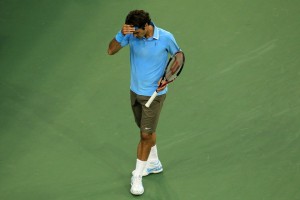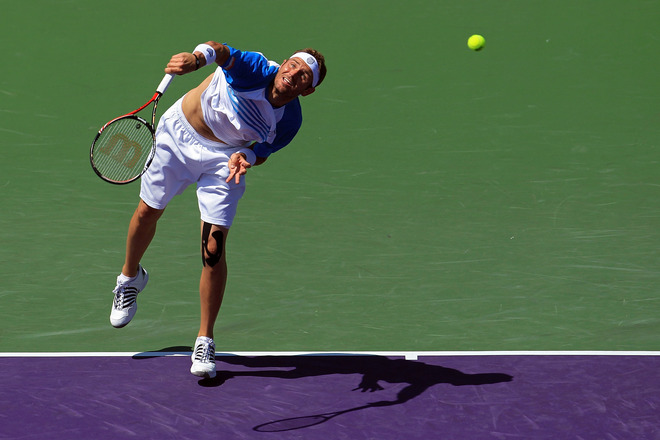Roger Federer settled into a seat for his post-loss press conference, his monogrammed cap, with the designer F, pulled down hard on his head and the collar of his monogrammed jacket turned up, as if there was a chill breeze blowing against his neck.

This has been a most difficult year for Federer’s swollen ego with losses at the French Open quarterfinals (Robin Soderling), in the Wimbledon semis (Tomas Berdych) and now in the U.S. Open semis on Saturday (Novak Djokovic), and this downturn in his fortunes has caused even those who have been enraptured by Federer’s performances over the years to wonder if he really is the greatest player ever to wield a racket.
This is the legend Federer wants for himself. The 16 Grand Slam titles, and who knows that there may be more, are important to him, but, in a sense, only as a ticket to being proclaimed tennis’ greatest.
But with every failure to reach a Slam final this year, coupled with the still rising quality of 24-year-old Rafael Nadal’s game, the doubts are creeping in.
“Could you be the best player ever?” one reporter asked Nadal after he had defeated Mikhail Youzhny in straight sets to reach the championship match earlier in the day.
“I am not of the way to be the best of the history, because that is very far,” Nadal countered with great dignity in an evolving English that manages to convey in almost poetic terms his full understanding of the issue that has placed on the table.
A few moments later Nadal was pressed again on the “greatest player ever” issue, a reporter citing his 14-7 career advantage over Federer. “Head to head is not an element for me. Is a part of the statistics, but is not the decisive element,” Nadal insisted. “Even a Grand Slam is important element, but is not all on the tennis, because for me some things, more important things and more difficult things to do than win a Grand Slam.”
There is still one match to go after persistent rains caused USTA officials at about 6:30 to declare the final between Nadal and Djokovic postponed until Monday.
But if Nadal wins this match, as expected, the “greatest ever” question is going to come to a quick boil on the front burner.
It’s a tricky issue, trying to determine who is the greatest anything, in any sport. Too often, the players being compared are from different eras, where the level of competition was not the same, where the equipment was not the same, where pressure of winning that comes with the big money is not the same.
Rod Laver or Federer? Pete Sampras or Federer? Any of those players and Nadal?
Who is to say how many Slams Laver would have won in the 1960s if there was Open Tennis before 1968? Who can say how much tougher it would have been for Federer if the All England Club had not changed the grass at Wimbledon to slow the game and make serve-and-volleyers like Sampras all but disappear?
Certainly a monumental case can be made for Federer with his 16 major titles and so many semifinal-or-better finishes in Slams that one loses count.
What makes the Federer-Nadal argument so intriguing is that they are from the same era and they’ve played each other 21 times, and therein lies the blurry lines for Federer’s claim to “greatest ever.”
To me, when you call someone the greatest player ever, it means, by definition, that there is no one who is better. And one of the beauties of tennis is that it’s one-on-one. Jack Kramer vs. Pancho Gonzalez. Pete Sampras vs. Andre Agassi. The best player is going to win, and that’s a fact that Federer can’t escape.
Nadal has won 14 of their 21 matches and, what’s even more telling in analyzing their one-on-one confrontations, is that the last three times they’ve met in a Grand Slam final – the ultimate test – Nadal has won each time. And each time on a different surface – clay, grass and hardcourt.
You could make a case that Federer was, at one time, the best player ever. But to say that today, at this moment in tennis history, he is the best player in the world is easily refutable.
The greatest difficulty, perhaps, in the debate of “greatest ever” is that the phrase commands no single definition. Does it mean the player with the highest number of Grand Slam singles titles? Does it mean the most titles overall? Does it mean the best player over a standardized number of years? Or is it, on the bottom line, simply a subjective view based on one’s examination of the skills of the players being considered?
Probably it’s a combination of all those things and, notwithstanding Nadal’s very diplomatic downplaying of head-to-head competition, it’s critical because it directly separates two players.
You say you’re the best ever. I say I’m the best ever. Let’s go on court and settle the issue.
If Nadal wins the Open, he will have nine Grand Slam titles, seven fewer than Federer. But Nadal will hae won his ninth major at age 24 years and three months. Federer won his ninth at age 25 years and one month. It doesn’t mean Nadal is going three more majors by the time he’s 25 (June 3). It’s just a benchmark to show you how each is proceeding.
In fact, Nadal’s road to 16 or more majors probably will be more difficult than Federer’s. Roger dominated at a time when his most important opponents (Nadal, Djokovic and Andy Murray) were very young and still finding the maturity and consistency that takes you from very, very good to very, very elite.
Nadal will have to face a fully matured Murray and Djokovic, plus Federer, plus emerging elite players Soderling, Berdych and Juan Martin Del Potro in his immediate future.
As for the details of the Federer loss to Djokovic on Saturday:
It was surprising on two counts. First, because Djokovic has had a very up and down year, hiring Todd Martin, then dismissing Martin, changing his serve, then changing back to his old serve. For a long time he didn’t resemble a top-10 player and I and many others who know the game could not select him as one of the three players most likely to win this U.S. Open. Yet he arrived in New York emotionally strong and stayed that way throughout the tournament.
Secondly, because he’s never looked this strong emotionally, not even when he won the Australian Open a couple years ago. His focus and aggressiveness down the stretch of the fifth set Saturday finally showed how powerful a figure he can be, when he wants to, in professional tennis.
Federer, meanwhile, had seldom looked this good in some time. The addition of Paul Annacone to his coaching staff influenced him to become more aggressive early in the points. Federer is one of those players who has liked to take complete command of a point, when receiving, at about the fifth or sixth stroke. At this Open, he was more aggressive, riskier if you will, right off service returns.
He hadn’t lost a set in the tournament until Djokovic won the second set 6-1. But when the money was on the table with Djokovic serving at 6-5 in the fifth, Federer went to pieces.
At 15-30, Federer could easily have been up 15-40 with double-break to get into a tiebreak after forcing Djokovic to stretch wide right for a volley that was so short and high that Federer easily reached it.
There was Djokovic dead center of the court, apparently frozen there. Novak’s backhand side was wide open. You could almost have bunted the ball down the line for the point. Incredibly, Federer out-thought himself, apparently thinking Djokovic was going to dash left to cover the down the line. Federer hit the ball instead right at Djokovic, who parried it away for 30-all.
Still, Federer had a break point at 30-40. This time, he had a simple forehand from the center of the baseline – not quite a real inside-out – and he slapped into the net for deuce.
On match point, weary of a long rally in which he could not break down Novak, he decided to take his shot – an inside-out from the left corner. It was wide. It was over.
Maybe Federer thought this was 2007 again, where he preyed on Djokovic’s then-fragile emotional state to win in straight sets. But there would be no mental breakdown this time.
At least not by Djokovic.

